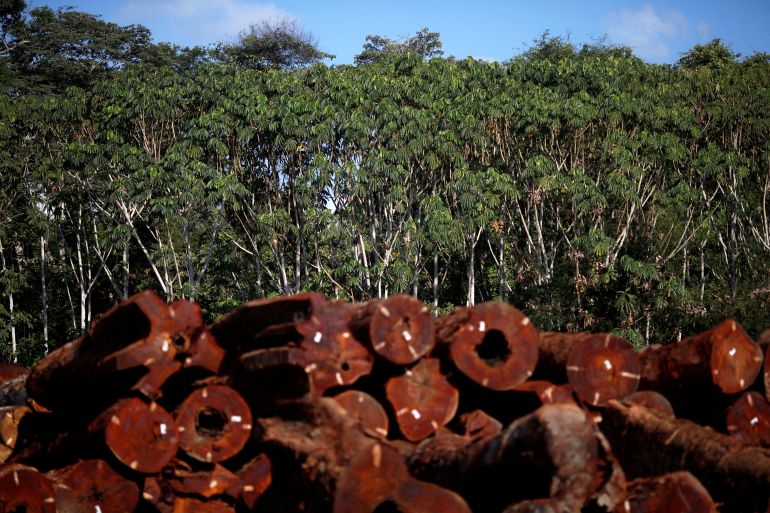Indigenous lands block deforestation in Brazil, new study finds
‘Satellite images leave no doubt that Indigenous peoples are slowing the destruction of the Amazon,’ researcher says.

Indigenous reservations in Brazil have acted as a barrier against deforestation over the past three decades, according to a new study, although destruction of the Amazon rainforest has accelerated recently under far-right President Jair Bolsonaro.
Of the 69 million hectares (170 million acres) of native vegetation Brazil has lost in the past 30 years, just 1.6 percent was on Indigenous lands, said the report from MapBiomas, a joint project among various environmental groups, universities and startups.
Keep reading
list of 3 itemsDeforestation in Brazil’s Amazon rising, despite COP26 pledges
Brazil sets ‘worrying’ new Amazon deforestation record
Around 70 percent of the deforested area was on private land, it found.
“The satellite images leave no doubt that Indigenous peoples are slowing the destruction of the Amazon,” said Tasso Azevedo, the coordinator of the project.
“Without Indigenous reservations, the forest would certainly be much closer to the ‘tipping point’ at which it stops providing the ecological services our agriculture, industries and cities depend upon.”
The findings are the latest of numerous studies to show that protecting Indigenous lands is one of the best ways to slow the destruction of native forests, which are vital resources in the race to curb climate change.
Indigenous reservations account for 13.9 percent of Brazil’s territory, covering 109.7 million hectares (271.1 million acres) of native vegetation – nearly one-fourth of the country’s total.
But they face increasing pressure under Bolsonaro, who was elected on a promise not to allow “a single centimetre more” of Indigenous reservations to be created.
Destruction of the world’s largest rainforest has surged since Bolsonaro took office in 2019 and weakened environmental protections, arguing that they hinder economic development that could reduce poverty in the Amazon region.
Representatives of 100 Indigenous tribes were in the capital, Brasilia, this month to demand more protection for their lands and denounce proposed laws that would allow the government to further exploit the rainforest.
The protest came as Brazil set a new grim record for Amazon deforestation during the first three months of 2022 compared with a year earlier, according to government data.
From January to March, deforestation in the Brazilian Amazon rose 64 percent from a year ago to 94,100 hectares (232,526 acres), data from the National Insitute for Space Research (INPE) showed earlier this month.
The destruction has been driven mainly by farming and land speculation in Brazil, an agricultural powerhouse and the world’s largest exporter of beef and soy. The country hosts about 60 percent of the Amazon rainforest.
Raoni Rajao, a professor of environmental management at Federal University of Minas Gerais, told Al Jazeera when the INPE data was released that the situation was “quite dire”.
“The fact that we are already at a record high and actually [seeing] numbers that are usually to be expected mid-year – when it’s drier and it’s actually easier to access the forest and do some damage – is indeed worrying,” Rajao said.